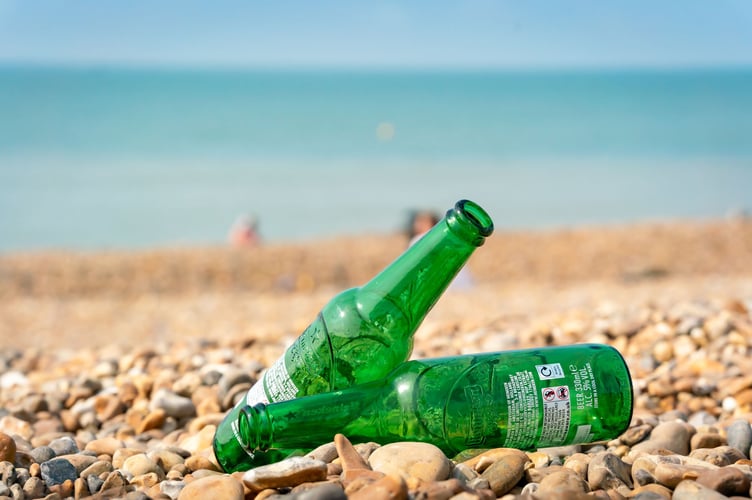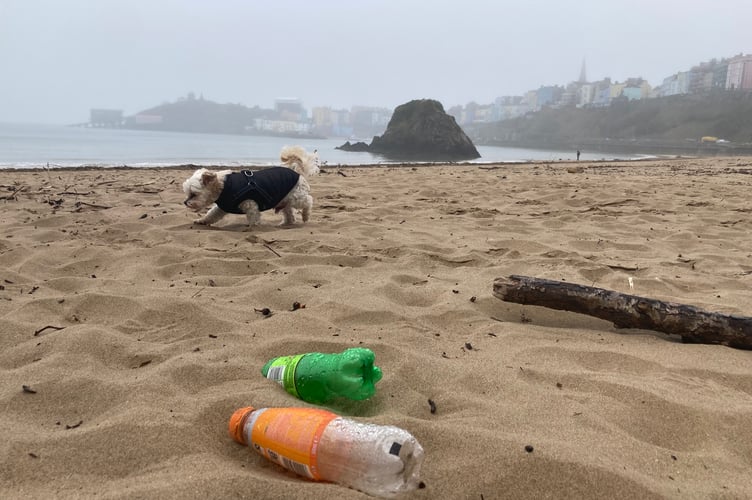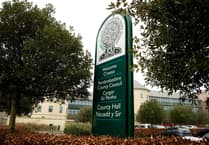Discarded bottles and cans were found on an ‘alarming’ 99% of Welsh beaches during 2024, while plastic litter across UK beaches increased by almost 10%, an annual survey has found, with calls for a deposit return scheme to be introduced swiftly to tackle the problem.
The Marine Conservation Society, the UK’s leading ocean membership charity, in its annual report, State of our Beaches 2024, has called for urgent action to be taken to reduce beach pollution following what it called ‘alarming’ new data collected by their beach clean volunteers as part of the Beachwatch programme.
The report shows that ‘drinks-related litter’ was found on 99% of Welsh beaches, with glass bottles present on almost half (49%) of Welsh beaches surveyed.
The charity is calling on the Welsh Government to promptly introduce a planned Deposit Return Scheme (DRS) that includes glass in a bid to lessen the problem.
The proposed DRS will see consumers pay a small deposit on top of the price of a drink, which you get back when you return the empty container to a designated collection point.
UK-wide, the charity found that plastic litter increased by 9.5% from the previous year.
In Wales, 119 surveys were recorded in 2024, an increase of eight% from the previous year.
A total of 1,073 volunteers participated in the charity’s beach clean programme, gathering and recording all litter items found along 100-metre stretches of beach.
Volunteers in Wales found an average of 120 litter items for every 100 metres of surveyed beaches - up four per cent from the previous year, suggesting that despite ongoing efforts, the issue of beach pollution still persists.
The report said that, in Wales, volunteer surveys revealed an average of 10 drinks-related litter items, such as cans, plastic and glass bottles, were found per 100-metre stretch of beach with drinks-related litter present on 99% of beaches surveyed.

The Marine Conservation Society said it is calling for a Deposit Return Scheme in Wales to align with the rest of the UK, and for it to include glass.
A total of 175 glass bottles were collected by volunteers across beaches in Wales, and were recorded on almost half (49%) of cleans.
The charity’s data shows that the presence of glass litter on beaches is steadily increasing, with 2024 marking the ninth highest year since records began 31 years ago.
The charity said that glass litter on beaches “poses a significant threat to marine life and beach goers alike, as sharp edges can cause serious injuries.”
The DRS scheme aims to promote recycling and reduce litter, with proven success shown in other countries around the world, such as Finland, Lithuania and Sweden.
While England, Scotland, and Northern Ireland are progressing with a UK-wide DRS set to launch in October 2027, Wales has opted to introduce its own version, which will also include glass containers.
In November 2024, the Welsh Government announced its decision to withdraw from the UK-wide Deposit Return Scheme and implement its own version.
This move came after challenges related to the United Kingdom Internal Market Act 2020, which governs trade between the UK nations.
The Welsh Government had previously raised concerns that the UK-wide scheme does not align with their recycling objectives, particularly in terms of including glass containers within the scheme.
The Welsh Government has begun talks with environmental groups, businesses and local authorities over the planned scheme, with a formal public consultation on the DRS scheduled to begin in May.
Across the UK, the report shows volunteers collected and recorded a staggering three quarters of a million (764,451) pieces of litter across the UK, averaging 170 items per 100 metres of coastline.
The results from the charity’s beach cleaning programme shows that almost two pieces of litter (1.7), were found on every metre of surveyed UK beaches.
46% of litter is from public sources; household litter washing its way into our seas via rivers, drainage and sewage outlets, or blown or dropped onto our coastline.
Lizzie Price, Beachwatch Manager at the Marine Conservation Society, said: “Thanks to over 15,000 volunteers last year, the data from our beach cleans is clear: plastic pollution remains a huge problem for our marine environment.”
Plastic fragments topped the list of most common litter items, followed by single-use plastic packets—including crisp, sweet, and sandwich wrappers.
Other problematic items included bottle caps and lids and string and cord, which pose serious threats to marine life.
“Plastics endanger marine life through ingestion, entanglement and toxic contamination,” the charity said.
“Seabirds, seals, and fish often mistake plastic for food, leading to internal injuries, starvation, and even death.
“Microplastics - tiny plastic particles that come from broken-down plastics - are now present in the ocean and food chain, posing a long-term threat to both wildlife and human health.”
The charity is calling for urgent policy changes to tackle the issue at its source, including stronger legislation to curb the use of single-use plastics.
Among the most frequently recorded waste were plastic caps and lids, found on 88% of beaches, and plastic bottles and containers, which appeared on 71% of surveyed sites.
The latest survey continued a trend of seeing fewer carrier bags on beaches since the introduction of carrier bag charges.
In October 2011 Wales became the first UK country to introduce a charge for single use carrier bags, while Scotland followed suit in 2014 and England in 2015.
The report said: “Since the introduction of carrier bag charges, we have seen a really positive difference on our coastline, with data gathered by volunteers showing an 80% decrease of plastic carrier bags found on our beaches.
Beachwatch data has already been used by governments across the UK as evidence to introduce litter reducing policy - such as the carrier bag charges and bans on certain single-use plastics, such as straws, cutlery, plates and bowls, and the recent UK-wide commitment to ban plastic wet wipes.
Overall during 2024, 15,168 Marine Conservation Society volunteers got involved in beach cleans, removing 764,451 litter items from the UK coast.
92 miles of beach were cleaned across the UK and Channel Islands, with 17 tonnes of litter removed from beaches.
Volunteers spent 24,407 hours cleaning and recording litter on beaches for the annual survey.
Inland volunteers also took part in the Source to Sea Litter Quest, removing 13,326 items from towns, park and rivers to prevent them ending up on the coast.
Plastic accounted for 72% of all recorded litter items in that project, with 91% of cleans UK-wide finding plastic bottles or lids.

Single-use plastics made up four of the top five items found, while 80 per cent of cleans found glass bottles.
Inland volunteers collected 417 bags of litter weighing 1,404kg.
For the last 10 years players of People’s Postcode Lottery have helped fund the Marine Conservation Society’s beach cleaning programme.
The charity highlights the importance of our ocean, and the life within it, through working with governments, communities, and industry to take action to restore and protect the marine environment.
The charity’s beach cleans and litter surveys happen all year round, including later this year when the annual September Great British Beach Clean takes place between Friday, 19 and Sunday, 28 September.





Comments
This article has no comments yet. Be the first to leave a comment.